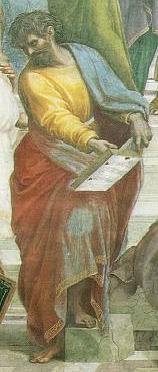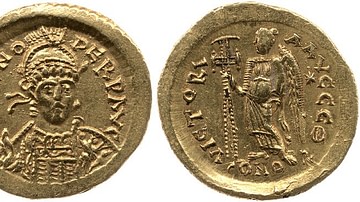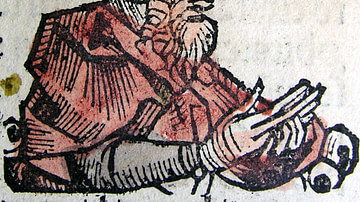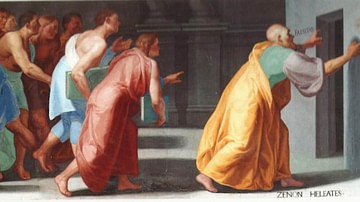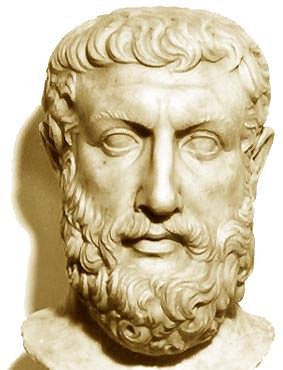
Parmenides (l.c. 485 BCE) of Elea was a Greek philosopher from the colony of Elea in southern Italy. He is considered among the most important of the Pre-Socratic philosophers who initiated philosophic inquiry in Greece beginning with Thales of Miletus (l. c. 585 BCE) in the 6th century BCE.
He is known as the founder of the Eleatic School of philosophy which taught a strict Monistic view of reality. Philosophical Monism is the belief that all of the sensible world is of one, basic, substance and being, un-created and indestructible. According to the ancient writer Diogenes Laertius (l.c. 180-240 CE), Parmenides was a student of Xenophanes of Colophon (l. c. 570-c.478 BCE) - who some claim as the founder of the Eleatic School - and, having mastered Xenophanes' teaching, left to pursue his own vision.
It is probable that he was Xenophanes' student as the stamp of the elder philosopher's teachings can be seen in the work of Parmenides in that both assert that the things in life which one thinks one understands may be quite different than they seem to be, especially regarding an understanding of the gods.
Xenophanes' insistence on a single deity, who in no way resembled human beings, seems to have been the basis for Parmenides' claim of a single substance comprising all of reality. Parmenides was a younger contemporary of Heraclitus (l.c. 500 BCE) who claimed that all things are constantly in motion and that the First Cause - the basic `stuff' of life - is change itself. Parmenides' thought could not be further removed from that of Heraclitus in that Parmenides claimed nothing moved, change was an impossibility, and that human sense perception could not be relied upon for an apprehension of Truth.
Parmenides' philosophy, championed by his student Zeno of Elea (l. c. 465 BCE) and clarified and developed by Melissus of Samos (l.c. 5th century BCE) would contribute to the later philosophies of Plato (l. 428/427-348/347 BCE) and his student Aristotle (l. 384-322 BCE) whose works established the foundation of Western philosophy. The central vision of Parmenides' work is that change is an illusion - appearances change but not essense - which is later reflected in Plato's Theory of Forms which claims that the observable world is only a reflection of a higher, truer, reality.
The Philosopher of Changeless Being
According to Parmenides, “There is a way which is and a way which is not” (a way of fact, or truth, and a way of opinion about things) and one must come to an understanding of the way “which is” to understand the nature of life. Known as the Philosopher of Changeless Being, Parmenides' insistance on an eternal, single Truth and his repudiation of relativism and mutability would greatly influence the young philosopher Plato and, through him, Aristotle, though the latter would interpret Parmenides' Truth quite differently than his master did and reject the concept of an ethereal, unprovable, higher realm.
Plato devoted a dialogue to the elder philosopher, the Parmenides, in which Parmenides and his student, Zeno, come to Athens and instruct a young Socrates in philosophical wisdom. This is quite an homage to the thought of Parmenides in that, in most dialogues, Plato presents Socrates as the wise questioner who needs no instruction from anyone. While Parmenides was an older contemporary of Socrates, it is doubtful the two men ever met and Plato's dialogue is considered an idealized account of the philosopher though accurate in portraying his philosophy.
Defence by Zeno
Zeno of Elea was Parmenides' most famous student and wrote forty paradoxes in defense of his claim that change – and even motion – were illusions which one must disregard in order to know the nature of oneself and that of the universe. Zeno's work was intended to clarify and defend Parmenides' statements, such as:
There is not, nor will there be, anything other than what is since indeed Destiny has fettered it to remain whole and immovable. Therefore those things which mortals have established, believing them to be true, will be mere names: "'coming into being and passing away,' 'being and not being,' 'change of place'...(Robinson, 116)
In other words, Parmenides argues, one may think the world one lives in is comprised of multiples but, in reality, it is One. A person may think they change with age, for example, but that is only one's outward appearance, not one's essence. One's essence is a part of the whole of the Universe and every other living thing in it. Nothing is capable of inherently changing in any significant fashion because the very substance of reality is unchangeable and 'nothingness' cannot be comprehended.
Nothing Can Come from Nothing
It seems that Parmenides' claims were hard to comprehend for his listeners, necessitating Zeno's mathematical paradoxes. Parmenides' main point, however, was simply that nothing could come from nothing, that being must have always existed, and that reality was uniform, unbroken, and unbreakable. He writes:
There is left but this single path to tell thee of: namely, that being is. And on this path there are many proofs that being is without beginning and indestructible; it is universal, existing alone, immovable and without end; nor ever was it nor will it be, since it now is, all together, one, and continuous. For what generating of it wilt thou seek out? From what did it grow, and how? I will not permit thee to say or to think that it came from not-being; for it is impossible to think or to say that not-being is. What would then have stirred it into activity that it should arise from not-being later rather than earlier? So it is necessary that being either is absolutely or is not. Nor will the force of the argument permit that anything spring from being except being itself. Therefore justice does not slacken her fetters to permit generation or destruction, but holds being firm. (Fairbanks, 93)
Being & Not Being
Simply put, his argument is that since 'something' cannot come from 'nothing' then 'something' must have always existed in order to produce the sensible world. This world one perceives, then, is of one substance - that same substance from which it came - and those who inhabit it share in this same unity of substance. Therefore, if it should appear that a person is born from `nowhere' or that one dies and goes somewhere else, both of these perceptions must be wrong since that which is now can never have been 'not' nor can it ever 'not be'.
In this, Parmenides may be developing ideas from the earlier philosopher Pythagoras (l.c. 571-c.497 BCE) who claimed the soul is immortal and returns to the sensible world repeatedly through reincarnation. If so, however, Parmenides radically departed from Pythagorean thought which not only allows for, but depends upon, plurality. Change is not only possible in life, to Pythagoras, but necessary in order for life to be life. To Parmenides, and his disciples of the Eleatic School (including, possibly, Melissus of Samos), such a claim would be evidence of belief in the senses which, they insisted, could never be trusted to reveal the truth.
Conclusion
The Eleatic claim that all is One and unchanging exerted considerable influence on later philosophers and schools of thought. Besides Plato (who, in addition to the dialogue Parmenides also addressed Eleatic concepts in his dialogues of the Sophist and the Statesman), the famous Sophist Gorgias (l.c. 427 BCE) employed Eleatic reasoning and principles in his work in claiming that "true knowledge" could not be known and what passed for "knowledge" in the world was only opinion. Gorgias, founder of the Skeptic school of philosophy, took Parmenides' assertions of "a way that is and a way that is not", the unreliability of the senses, and the unchangeable nature of reality to mean that what is observable is not Truth and what is Truth is not observable nor communicable.
Aristotle would also draw on Parmenides' philosophy, principally in his Metaphysics, in developing his own. Aristotle's assertion that the First Cause of all things in the universe is the Prime Mover (or the Unmoved Mover) - the force which set everything in motion but does not move itself - can be traced back directly to Parmenides' claim regarding reality as fixed and unchanging in its essence. This concept, in turn, would influence the thought of Leucippus and Democritus, most likely through the works of Melissus of Samos who clarified Parmenides' thought and developed it, leading to their formulation of the theory of the atomic universe.
